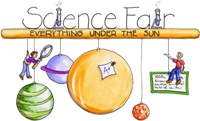

Comparing the Antioxidant Effects of Vitamins
The Objective : The goal of my project was to determine the Vitamin (A, C, or E) that would most effectively neutralize free radicals, thereby creating a favorable environment for seed germination.
Methods/Materials
I conducted 32 trials (a total of 160 readings) consisting of 80 readings with mung bean seeds and 80 readings with radish seeds.Each trial involved three vitamins, A, C and E.
One vitamin was added to each Petri dish (containing seeds in hydrogen peroxide), in order to determine the vitamin with the most effective antioxidant properties to counter the harmful effects of free radicals.
This was measured by counting the number of seeds that germinated successfully, in the presence of each vitamin.I averaged the results separately for each type of seed.
Finally, I calculated the combined average for both sets of trials.
Results
Vitamin E most effectively neutralizes free radicals during the germination of radish seeds while mung bean seeds show identical rates of germination when supplemented by either Vitamin A or E.
Conclusions/Discussion
My hypothesis was incorrect: Vitamin A was not the most effective vitamin to neutralize the free radicals in hydrogen peroxide.
Germination environments containing Vitamin E allowed for the greatest rate of seed growth overall suggesting that it was the most effective vitamin in neutralizing the free radicals in H2O2.
I am currently pursuing a follow-up experiment to see if the any (or all) of the vitamins themselves are responsible for lowering the rate of germination of the seeds as opposed to the free radicals in H2O2.
This project is to determine which Vitamin (A,C or E) would most effectively neutralize free radicals.
Science Fair Project done By Easun Arunachalam
<<Back To Topics Page...................................................................................>>Next Topic
Related Projects : Caffeine: An "Astro-pharmaceutical" Defense for DNA ,Antibacterial Properties of Chitosan Nanoparticles , Antioxidant Effect of Vitamin E on Plant and Animal Tissues , Caffeine: Friend or Foe , Can We Use a Biological Agent to Control a Plant Disease , Characterizing the Role of Arachidonic Acid-Derived Eicosanoids in Breast Cancer , Chondrocyte Response to Mechanical Injury , Comparing the Antioxidant Effects of Vitamins , Does Caffeine Affect the Running Speed , Does the pH Level of a Liquid Affect the Solubility of Aleve
Copyright © www.kidsprojects.info 2012 through 2014
Designed & Developed by Freddy